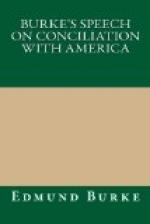[Footnote: 31. their liberties. Compare 24]
[Footnote: 32. sudden or partial view. Goodrich, in his Select British Eloquence, speaking of Burke’s comprehensiveness in discussing his subject, compares him to one standing upon an eminence, taking a large and rounded view of it on every side. The justice of this observation is seen in such instances as the above. It is this breadth and clearness of vision more than anything else that distinguishes Burke so sharply from his contemporaries.]
[Footnote: 33. three ways. How does the first differ from the third?]
[Footnote: 34. Spoliatis arma supersunt. Though plundered their arms still remain.]
[Footnote: 35. your speech would betray you. “Thy speech bewrayeth thee”—Matt. xxvi 73. There is much justice in the observation that Burke is often verbose, yet such paragraphs as this prove how well he knew to condense and prune his expression. It is an excellent plan to select from day to day passages of this sort and commit them to memory for recitation when the speech has been finished.]
[Footnote: 36. to persuade slaves. Does this suggest one of Byron’s poems?]
[Footnote: 37. causes of quarrel. The Assembly of Virginia in 1770 attempted to restrict the slave trade. Other colonies made the same effort, but Parliament vetoed these measures, accompanying its action with the blunt statement that the slave trade was profitable to England. Observe how effectively Burke uses his wide knowledge of history.]
[Footnote: 38. ex vi termini. From the force of the word.]
[Footnote: 39. abstract right. Compare with 14; also 8. Point out connection in thought.]
[Footnote: 40. Act of Henry the Eighth. Burke alludes to this in his letter to the sheriffs of Bristol in the following terms: “To try a man under this Act is to condemn him unheard. A person is brought hither in the dungeon of a ship hold; thence he is vomited into a dungeon on land, loaded with irons, unfurnished with money, unsupported by friends, three thousand miles from all means of calling upon or confronting evidence, where no one local circumstance that tends to detect perjury can possibly be judged of;—such a person may be executed according to form, but he can never be tried according to justice.”]
[Footnote: 41. correctly right. Explain.]
[Footnote: 42. Paradise Lost, II., 392-394.]
[Footnote: 43. This passage should be carefully studied. Burke’s theory of government is given in the Conciliation by just such lines as these. Refer to other instances of principles which he considers fundamental in matters of government.]
[Footnote: 44. exquisite. Exact meaning?]
[Footnote: 45. trade laws. What would have been the nature of a change beneficial to the colonies?]
[Footnote: 46. English conquest. At Henry II.’s accession, 1154, Ireland had fallen from the civilization which had once flourished upon her soil and which had been introduced by her missionaries into England during the seventh century. Henry II. obtained the sanction of the Pope, invaded the island, and partially subdued the inhabitants. For an interesting account of England’s relations to Ireland the student should consult Green’s Short History of the English People.]




